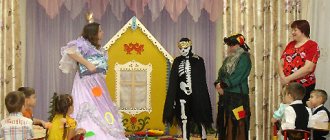Games 30. Plant
First of all, you need to make a plant - a tree, a flower - from any available materials. Then the child composes a fairy tale about him. The main thing is that in the story the child describes in detail how the plant feels - is it comfortable or is something bothering it.
Through these metaphors, an adult can understand what is bothering the child. If there is a cause for concern, ask your child what you can do to help the plant - build a fence, call a fairy, plant other trees. This way the baby will use the example of a fairy tale to cope with his anxieties.
Games 31. Face games
In children who have suffered some unpleasant events in life, a frozen mask may appear on their face and emotions disappear. You can motivate your child in several ways - invite him to play tricks, make funny faces with him, or organize a home theater.
Games 32. Simple holidays
Allow your baby to feel the holiday in your life as often as possible. Try to turn every simple event into something bright and unusual. For example, the festival of making the bed, washing, the festival of lunch. Be sure to record any of your child’s achievements, write them down or draw them - this motivates and builds confidence in yourself and your abilities.
Games 33. Color therapy
If your child often returns to unpleasant events in the past, focus his attention on the current day, for example, come up with a specific color for each day of the week and try to stick to it. For example, let Monday be blue - pick up such clothes, look for blue objects around.
Games 34. Schedule
To stabilize a child’s condition after a stressful situation, it is necessary to structure his daily routine, draw up a schedule, and decorate it. The kid must monitor its implementation. On the one hand, it teaches discipline, and on the other, it distracts from unpleasant thoughts.
Advice! Anxious children prone to stress intuitively choose outdoor games where they need to jump. This helps relieve tension and feel supported. Create an area for your child where he can jump safely and happily.
Conflict situations sometimes occur between children, and here play becomes critically important, since with its help the child relieves stress and relaxes . Of course, games should be appropriate for the child’s age and development, be diverse and useful. This is what we will talk about in our material.
Where to find time to play with your child
This question is asked by many parents, since modern moms and dads are busy people who have a lot of household responsibilities, work, of course, and a natural desire to take time for themselves and relax. Due to the fact that there is not enough time to spend with the baby, parents often worry and worry. Psychologists assure that you can find time to communicate with your child if you follow simple tips.
Tip 1 – play with your child and mind your own business at the same time.
Games that do not require special training or additional items can be played in the kitchen, bathroom, or on the street. If you don’t feel like playing, involve your child in homework, do something together, for example, make pizza, or just let your child help you.
The main thing is to talk to the child more, explain, praise and support.
Tip 2 – use any free minute.
Transport, queues, the road to somewhere - this time can be used profitably. Tell your child about natural phenomena, make riddles, compose fairy tales, play counting and words.
Tip 3 – games and activities should become a habit.
Of course, we are not talking about classes for an hour or two. Make it a rule to work with your child every day for 15-20 minutes; this will be quite enough for a child aged 6-7 years. For example, read a book to your child before bed.
Tip 4 – try to create a nurturing environment at home.
Use posters, manuals, cards, magnetic games. The more educational objects there are around a child, the faster he will remember information. Please note that developmental aids should be bright and colorful.
Tip 5 – find company for your child.
If this is the case and you cannot play with your baby, try to find children for him with whom he can spend his time.
Educational games for children 4-5 years old
Role-playing games at this age expand in themes and plots. Kids are able to imagine themselves as drivers, salesmen, doctors and act in accordance with the role. Playing role-playing games with peers is much more interesting than with adults at home!
Motor skills games continue to develop the ability to climb, jump, walk backwards, move at different paces, cut, sculpt, design. At the age of 4-5, children are already able to master the rules, so outdoor games according to the rules with a driver, using game rhymes and songs, are added to the classes.
Didactic games continue to introduce 4-5 year old children to color and shape, teach them to master counting objects, perform simple mathematical operations of addition and subtraction one at a time, broaden their horizons and ideas about the world of animals, plants, professions and occupations of humans, and the structure of the Earth.
Games for speech development for 4-5 years old are aimed at improving speech and expanding vocabulary. Preschoolers of this age are able to master complex sentences, reason on given topics, retell stories they have heard and seen, compose a story based on a picture, and even compose simple rhymes.
In addition to educational games for preschoolers, children's centers are happy to engage in theatrical activities, handicrafts, English, and musical activities. As a rule, parents who bring their children to classes at clubs are not disappointed and continue to take their children there for years to come.
Educational games for children 2-3 years old
First of all, we note role-playing games. This can be either classic mother-daughters or interaction with a doll that comes to children’s classes and gives them interesting tasks.
Games for both fine and gross motor skills are important. Sorting objects, climbing, throwing a ball, jumping over low obstacles, not just in the company of an adult, but also together with other kids, coordinating efforts, taking turns, showing patience and demonstrating mutual assistance, is very useful for two-year-old children. Two- and three-year-old children are able to cut out simple shapes (strips, pieces) with children's scissors, sculpt from plasticine, draw “scrawls” and name them thematically.
Educational games for children
Oh, what a pity that there are no developmental games for adults! Many uncles and aunts would be happy to sing songs according to a schedule, tumble in the pool and draw suns and houses to hang on the common wall. Since publications appeared in the media with stories about the discoveries of psychologists and neurophysiologists in the field of child development, the idea of developing children through special efforts has been implemented in special institutions - children's centers and clubs. As a rule, classes in such institutions are called “developmental classes.” Their difference from a kindergarten lies in the optional presence of routine moments: sleep, lunch and dinner, etc.
Educational activities and games for children from 2 to 11 years old
Go to classes
Just think: the whole point of educational activities for children is to help parents organize fun and useful leisure time for their child. Yes, you can attract parents with various slogans and meanings: “after three it’s too late,” “we need to raise a harmonious child,” and others. But the truth of life is that no matter what we do with children, any activity develops them. Especially if there are elements of novelty in this activity. Teachers really know how to take care of this.
What is customary to do in children's centers and clubs? Educational games, in contrast to entertaining ones, help the child gain new experience, learn to solve new life problems, and teach them to build communication around a gaming problem situation. In children's centers and clubs, children engage in activities that they cannot do at home or on playgrounds, because there are not many parents with minimal pedagogical training. Let's get acquainted with the games that “developers” can offer you.









